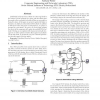108 search results - page 16 / 22 » Agents that Learn to Explain Themselves |
108
click to vote
GECCO
2006
Springer
15 years 2 months ago
2006
Springer
The impact of learning on evolution in dynamic environments undergoes recognized stages of the Baldwin Effect although its cause is not clear. To identify it experimentally, we de...
ATAL
2009
Springer
15 years 5 months ago
2009
Springer
This paper introduces a new model, i.e. state-coupled replicator dynamics, expanding the link between evolutionary game theory and multiagent reinforcement learning to multistate ...
EUMAS
2006
15 years 18 days ago
2006
One of the major puzzles in performing multi-agent-based simulations is the validity of their results. Optimisation of simulation parameters can lead to results that can be deceit...
WETICE
2002
IEEE
15 years 4 months ago
2002
IEEE
Distributed Denial-of-Service attacks are still a big threat to the Internet. Several proposals for coping with the attacks have been made in the recent past, but neither of them ...
AAAI
2010
15 years 20 days ago
2010
Quantitative modeling plays a key role in the natural sciences, and systems that address the task of inductive process modeling can assist researchers in explaining their data. In...

